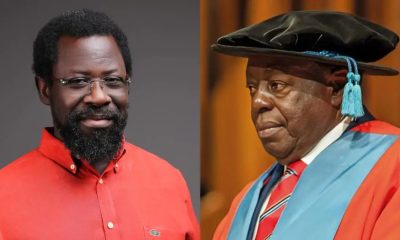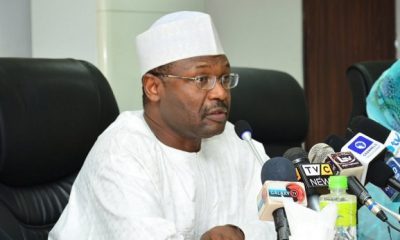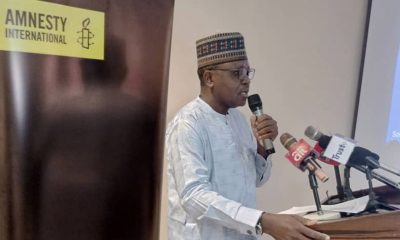Opinion
Farooq Kperogi: Five lessons from the ongoing hunger protests

Farooq Kperogi: Five lessons from the ongoing hunger protests
The nationwide #EndBadGovernance protests that are convulsing the neoliberal fundament of the Bola Ahmed Tinubu administration are redefining and redrawing the contours of protests in Nigeria in many significant ways. Although I’ve been on the road since Thursday, here are lessons I’ve learned from the protests.
One, there is now a profoundly consequential decentering of the locus of protest culture in Nigeria. In the past, protests against unpopular government policies used to be conceived, constructed, and carried out by a self-selected class of professional protesters based mostly in Lagos who earned activist bona fides from their anti-military, pro-democracy, human rights advocacy in the 1980s and 1990s.
These careerist agitators are now either in government, in bed with the government, or have suffered significant contraction of their symbolic and cultural capital. Most Gen Z Nigerians whose vim and vigor power the ongoing protests either don’t know them or know them but have no use for their guidance.
So, the conception, planning, and execution of the protests have neither a recognizable locale nor any identifiable dramatis personae. A lot of the known names identified with the protests merely joined and amplified it. They didn’t start the revolt and can’t stop it. It’s effectively a leaderless rebellion.
It started life as anguished, discordant murmurs on social media in response to the increasingly unendurable but relentlessly unabating neoliberal, IMF/World Bank-sanctioned economic and social terror of the Tinubu administration. Many of the young people who can’t feed now and whose future is being perpetually deferred have enough education to know that the delayed gratification the government promises them from removing subsidies and from devaluing the naira has never materialized anywhere in the world.
Everywhere in the world—from South America to the Pacific and from Asia to Africa—from the 1980s (when the IMF first forced Structural Adjustment Programs on developing countries) until now, there is not a single example of a country that has escaped irreversible devastation and decline as a result of subsidy removal, currency devaluation, destruction of social safety nets for the poor, abandonment of the welfare of citizens—all IMF policies that countries are forced to implement as conditions to secure World Bank loans.
READ ALSO:
- JUST IN: Kamala Harris formally declared US Democratic presidential candidate
- Protest organisers vow to continue rallies, ignore Adegboruwa
- Lagos barber goes mad after using native soap
The only countries that have developed outside the West are precisely the countries that have repulsed the IMF, that have strategically deployed subsidies to buoy their economies and uplift their people, and that have guarded their national currencies. Many young Nigerians now realize that the idea that the pains they are suffering are mere temporary birth pangs that will deliver a bouncing baby is a damned, soulless, conscienceless, self-centered lie. They’ve had enough.
So, they resolved to band together and fight peacefully. They chose to demand the restoration of petrol subsidies, among other demands, because they see that the people who took away petrol subsidies from them are themselves luxuriating in unimaginably opulent elite subsidies. Their cries quickly gained traction.
For the first time in a long time, northern and southern youth found common ground. Northern agitations for “zanga zanga” and southern push for #EndBadGovernance protests, though gestated independent of each other, somehow converged. It’s a unity forged in diversity and adversity.
The second lesson is a derivative of the first, and that is the unexampled collapse of the cultural, political, and social power of the Northern Nigerian Muslim clerical establishment. Northern Nigerian clerical elites, known as the ulama, had been constituted in the region’s moral imagination as the apotheosis of probity and the unquestioned source of moral and political guidance.
They have used this power, this priceless symbolic capital, to keep the masses perpetually in a state of suspended animation. They have programmed northern Nigerian masses to not resist, protest, rebel, much less revolt, against bad governance. They socialized them into accepting their economic suffering with equanimity. The only thing the clerical elites have conditioned the masses to be implacably roused and animated over is real or perceived slight against religion.
For example, amid the inexorably intensifying breakdown of security in the region during the Muhammadu Buhari administration, the clerical establishment also intensified fraudulent theological rationalizations for the rise of kidnappings and exculpated Buhari of responsibility for this.
However, although there was a ground swell of anti-zanga zanga sermonizing among the region’s notable clerics in the aftermath of their meeting with officials of the Tinubu administration, northern Nigeria is erupting in communal convulsions. It is also instructive that protesters in Daura took their anger to Muhammadu Buhari’s doorsteps. No one is immune now. The genie has been let out of the bottle.
The #OccupyNigeria protests in 2012, which the North also actively participated in largely, some would say precisely, because of the religious and regional identity of Goodluck Jonathan, had the moral imprimatur of the clerical establishment.
READ ALSO:
- US deploys jets, warships as Iran threatens Israel
- Canada set to deport Nigerian family over fake university acceptance letter
- Northern elders, economists advise Tinubu on how to end protests
This is the first major example in recent memory I am aware of in the North where the masses of the people not only bucked the impassioned counsel of their ulama but have openly labelled them as unreliable and mercenary charlatans not worthy of respect. This is a culturally seismic shift.
The third lesson is that the federal government is in more trouble than it realizes. It invited civil society leaders, traditional rulers, religious clerics, and certain audible voices in the protest movement in an effort to thwart the protest. It was inspired by the mistaken belief that these hitherto esteemed opinion molders had the capacity to use their conversational, symbolic, political, and cultural currencies to influence people to back out of the protest.
It didn’t work because the habitual order of things has shifted, and the government hasn’t come to terms with this reality. We call it decentering in humanities and social science scholarship. “Decentering” involves challenging and moving away from traditional centers of authority, meaning, or truth. It means a shift of focus from dominant cultures, narratives, or perspectives and the amplification of marginalized, peripheral, or alternative voices.
The government’s cluelessness about this social media-enabled decentering of traditional ways of seeing and knowing manifested in its mutually contradictory claims about who was sponsoring the protest—and in its counter-intuitive displays of persecution complex.
The State Security Service said it knew the “sponsors” of the protest, but the police asked the “sponsors” to identify themselves as a precondition for protection. High-profile government officials fingered foreign mercenaries as the organizers and funders of the protest. They all can’t wrap their heads around the possibility that distraught, depressed, and disgruntled young people, without prodding from anybody, can organize protests to ventilate their frustrations at foreign-inspired policies that kill their present and deny their future.
Unfortunately, the government’s response follows the same miserably familiar template: whine like over-indulged crybabies about fictive “sponsors,” induce or intimidate people thought to be behind the protests, deploy strong-arm tactics against protesters, and do nothing about the conditions that instigated the protest in the first place—until it happens again another time.
READ ALSO:
- Saraki replies Tambuwal: You never informed me of your withdrawal for Atiku in PDP primary
- Soyinka worries about festering corruption in Nigeria, offers solution
- Anxiety in Kogi over kidnap of local govt chairman
The fourth lesson is that there is a relationship between how security forces respond to protests and how they turn out. In such states as Edo, Osun, Oyo, and Ogun, the police were admirably polite and even-tempered.
I saw a video of the Edo State police commissioner addressing protesters in the kindest, most empathetic way I’ve ever seen any senior law enforcement officer addressing aggrieved people. The protesters reciprocated the police commissioner’s mild-mannered and conciliatory speech with chants of his praises. That warmed my heart. Tinubu can learn from that.
But in places where law enforcement officers treat protesters as enemies of the state and visit unprovoked violence on them, things easily escalate into violence and bloodshed. We saw that in Kaduna, Kano, Abuja, and many parts of the North.
It should be admitted, of course, that there are many criminal elements who cash in on protests to loot the properties of innocent people or destroy government properties. I saw heartrending videos of criminals stealing or destroying private and government properties in Kano and Abuja. Such outlaws deserve no mercy. It’s elements like that who justify the government’s apprehensions about protests always devolving into chaos and destruction.
Finally, although many people from the Southeast supported the protest, the region was the only place, as of the time of writing this column, where almost no protest took place. Was it the culmination of the ethnic baiting of the honchos of the Tinubu administration who said the protests were planned by the people of the region as a payback for their electoral loss in 2023? Whatever it is, it does not give a good account of our efforts at nation-building.
Well, President Tinubu has just one option left for him if he doesn’t want to govern in disabling tumult: address the nation in a solemn national broadcast, acknowledge the unprecedented hurt people are nursing, announce the restoration of petrol and electricity subsidies, and reverse the disastrous “floating” of the naira.
Tinubu’s loyalty should be to Nigeria, not the racist economic hitmen at the IMF and the World Bank.
Farooq Kperogi: Five lessons from the ongoing hunger protests
Farooq Kperogi is a renowned Nigerian columnist and United States-based Professor of Journalism
Opinion
Tinubu’s Buharization of NNPC By Farooq Kperogi
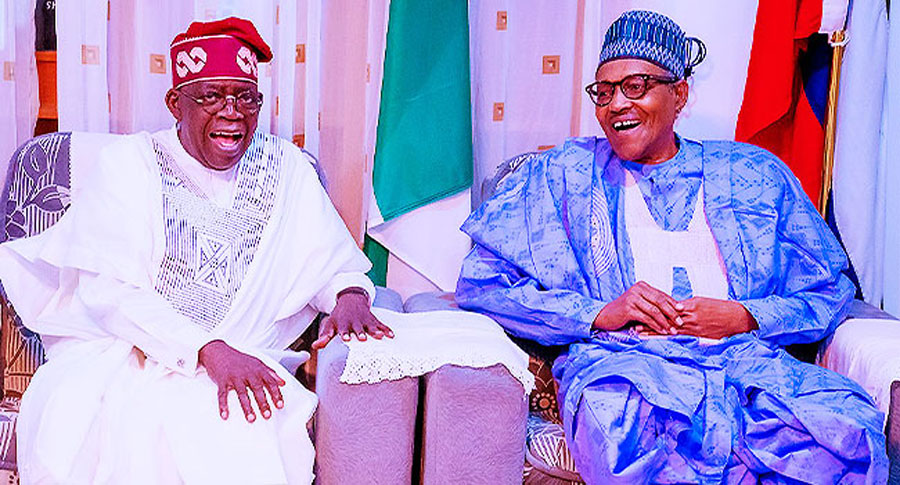
Tinubu’s Buharization of NNPC by Farooq Kperogi
After the sustained, unwarranted personal attacks I endured for eight years from northerners for unswervingly calling out what I called the “embarrassingly undisguised Arewacentricity of Buhari’s appointments” in a February 2, 2019, column titled “Even Ahmadu Bello Would Be Ashamed of Buhari’s Arewacentricity,” I promised that I would look the other way if a southern president returned the favor after Buhari’s tenure.
But promises made in the heat of disillusionment often crumble under the weight of principle.
Ironically, this column was inspired by a well-regarded Yoruba supporter of President Bola Ahmed Tinubu who is worried, in fact embarrassed, by the optics of what he says is Tinubu’s relentless Yorubacentric take-over of the Nigerian National Petroleum Company (NNPC).
His concern wasn’t just partisan discomfort; it was a profound unease about how this nepotistic approach undermines national cohesion.
I frankly hadn’t been paying attention to the internal dynamics at the NNPC, but the acquaintance pointed out that Yoruba people now occupy major positions at the NNPC and that a certain (person) is “being proposed as GMD after Mele Kyari’s term expires” early next year.
I haven’t independently confirmed the accuracy of this claim but given the closeness of the source of information to people in the circles of power, it’s probably best to not dismiss this with the wave of the hand.
His concern is that Tinubu, from the Southwest, is already the minister of petroleum. Senator Heineken Lokpobiri, the Minister of State for Petroleum and Chairman of the NNPC, is from the South-South. Chief Pius Akinyelure from the Southwest is NNPC’s Non-Executive Board Chairman.
READ ALSO:
- Lagos Imam to Tinubu: You haven’t disappointed us
- Ronaldo, Vinicius, Yamal win big at 2024 Globe Soccer Awards [Full list of winners]
- Vinicius should have won Ballon d’Or, not Rodri – Ronaldo
The head of the NNPC Upstream Investment Management Services (NUIMS), Mr. Bala Wunti, my acquaintance pointed out, has been replaced by one Seyi Omotowa. Gbenga Komolafe is the chief executive officer of the Nigerian Upstream Petroleum Regulatory Commission (NUPRC), making him the highest-ranking upstream regulator.
“If a Yoruba man were to be the GMD, another Yoruba man is the Chairman, and yet another Yoruba man is the regulator, that’s extreme lopsidedness,” and other parts of Nigeria would be justified to feel uncomfortable, my acquaintance said.
As with issues of this nature, the reality may be more complex that the surface-level impressions that I have been presented with. Of the 12-member non-executive Board of Directors, I counted at least four names that I recognize as northern, and that includes Kyari, the outgoing GMD.
The 7-member Senior Management Team on NNPC’s website has three northerners (if Kyari is included). That seems fair. Plus, Buhari actually appointed many of the Yoruba people in high places at the NNPC. By these metrics, one might argue that there’s a semblance of balance.
However, Tinubu’s broader public image tells a different story. His administration is rapidly cementing a reputation for Yorubacentric provincialism. Like the late Umaru Musa Yar’Adua, who governed Nigeria as if he were still a Katsina governor, Tinubu appears to be governing Nigeria as though he were still the governor of Lagos.
Just like Yar’adua was elected a Nigerian president but operated like a Katsina governor in Abuja, Tinubu is also, so far, a Nigerian president only in name. His mindset is still that of the governor of Lagos.
With a few notable (and in some cases unavoidable) exceptions, Tinubu’s government is largely the re-enactment of his time as the governor of Lagos. It is, for all practical purposes, an unabashed Lagos-centric Yorubacracy.
To be fair, though, with the possible exception of Olusegun Obasanjo’s administration, all civilian regimes since 1999 have been insular ethnocracies.
My source reminded me of a viral social media post I wrote on January 14, 2019, titled “New IGP: Why Progressive Northerners Should be Embarrassed” where I gave four reasons for being insistently censorious of Buhari’s Arewacentric appointments in response to southerners who asked why I was bothered since I was a northern Muslim who was “favored” by such appointments—“favored,” that is, on the emotional and symbolic plane.
READ ALSO:
- Nigeria Customs Service begins 2025 recruitment [How to apply]
- Dangote, Tinubu, Lookman, Badenoch named among 100 most influential Africans in 2024
- Heavy security in Ilesa as ex-Osun deputy gov emerges new Owa-Obokun
I pointed out that I criticized similar such parochial appointments by previous presidents from the South and that it would be hypocritical to look the other way because I was now “favored” by such appointments.
I said people from my region and religion won’t always be in power, and I wanted to be able to stand on a firm moral pedestal when I criticize future presidents who replicate Buhari’s (and previous presidents’) provincialism.
Most importantly, I said, I was personally embarrassed by Buhari’s insularity and that every progressive northerner should be. I described it as the sort of embarrassment you feel when your best friend who thinks highly of your mother visits you in your home and your mother, during a family dinner, gives you a considerably bigger food portion size and choicer pieces of meat than your friend.
“You feel like screaming: ‘Mom, I know you love me, but you’re embarrassing me by showing overt preferential treatment to me in the presence of my friend’,” I wrote.
The Yoruba acquaintance of mine who alerted me to the creeping Yoruba-centric take-over of the NNPC said he was doing so out of a feeling of the same sense of embarrassment that inspired my rage against Buhari’s appointments that favored the North unfairly, especially in the areas of security.
Tinubu is doing in the economy sector what Buhari did in the security sector. The minister of finance, the governor of the central bank, and every other consequential agency in finance is headed by a Yoruba man. I am not sure Nigeria has ever seen this level of extreme, state-sanctioned ethnocentric domination of a critical segment of national life.
Appointing another Yoruba individual as the head of the NNPC would complete what many already perceive as the ethnic capture of Nigeria’s economic nerve center. It would not only cement Tinubu’s image as an insensitive ethnocrat but also exacerbate public discontent and foster deeper divisions in an already polarized nation.
If Tinubu is unaware of this burgeoning perception, he needs to awaken to its reality. Leadership is not just about policies and actions; it’s also about managing optics and inspiring confidence in a nation’s collective identity.
In a September 5, 2015, column titled “Buhari is Losing the Symbolic War,” where I railed against the exclusion of Igbo people in Buhari’s first appointments, I wrote:
“Symbolism isn’t the same thing as substance. Appointing people to governmental positions does nothing to improve anybody’s lot—except, perhaps, the people so appointed and their immediate families.
“Jonathan’s disastrous 5-year presidency couldn’t even bring basic infrastructure like boreholes to his hometown of Otueke, yet his people derive vicarious satisfaction from the fact of his being Nigeria’s former president.
“Human beings are animated by a multiplicity of impulses, including rational and emotional impulses, both of which are legitimate. When we turn on our rational impulses, we may ask: What would appointing an Igbo man as SGF, for instance, do to Igbo people? The answer is ‘nothing.’
“But we are more than rational beings: we are also emotional beings. That’s why people are invested in symbolism. Appointing someone from the southeast or the deep south is merely a symbolic gesture, but it inspires a sense of inclusion in the minds of many people from that region; it serves as a symbolic conduit through which people vicariously connect with the government.”
This cycle of ethnic favoritism must end if Nigeria is to realize its full potential as a nation. To grow and thrive, we need leaders who can transcend the narrow confines of ethnocracy.
We need leadership that embraces diversity and inclusion, not as buzzwords but as guiding principles for governance. Only then can we begin to heal the fractures that divide us and build a nation that serves all its citizens, regardless of ethnicity or region.
Farooq Kperogi is a renowned Nigerian columnist and United States-based Professor of Media Studies.
Tinubu’s Buharization of NNPC by Farooq Kperogi
Opinion
Ademola Lookman showed Davido and Kemi Badenoch that wisdom is not by age – Omokri
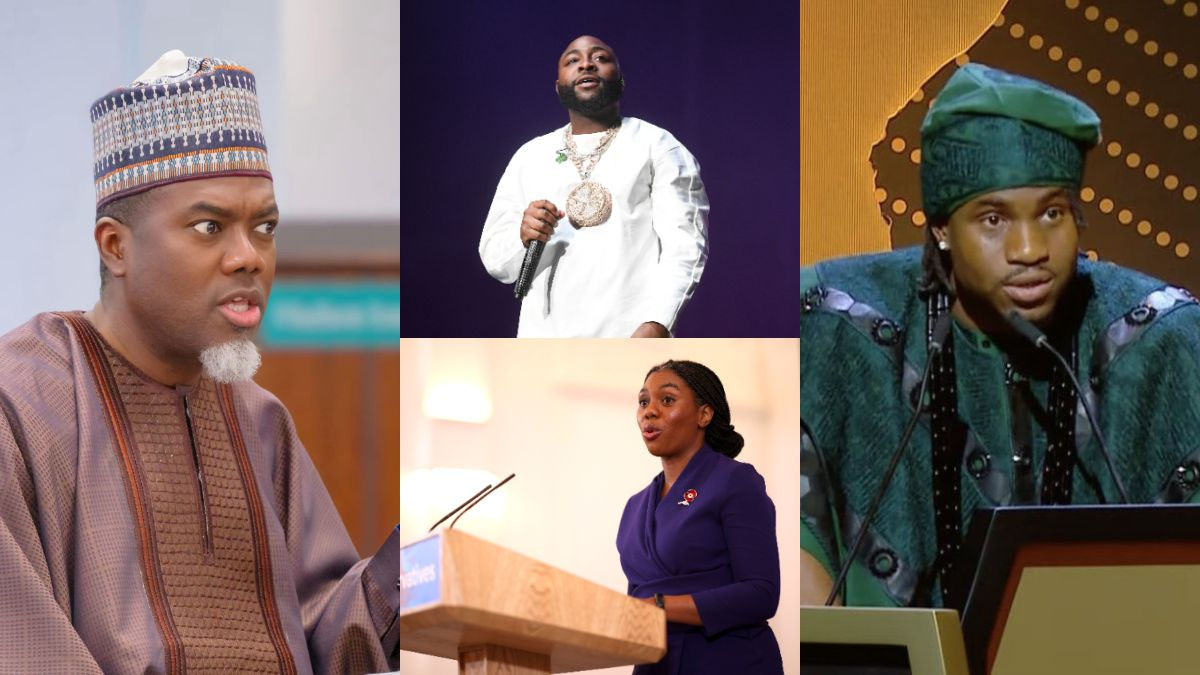
Ademola Lookman showed Davido and Kemi Badenoch that wisdom is not by age – Omokri
Recently, the singer David Adeleke was given a global stage to do whatever he wanted and deliver any message.
Sadly, Mr. Adeleke used the opportunity to speak in an American accent. Not only that, he used that American accent to talk down on Nigeria and tell the world not to invest in Nigeria because, as he put it, Nigeria’s “economy is in shambles”.
Coincidentally, a month after his faux pas, Kemi Badenoch, probably inspired by Davido, used her British accent to talk down Nigeria, calling us “a very poor country” where the police rob citizens.
But the interesting thing about her own case is that the next day, the BBC featured a panel of Conservative Party big shots, and one of them, Albie Amankona, a party chieftain from Chiswick, who is also a celebrity broadcaster, said, and this is a direct quote:
“If you are a Brexiteer, and you are saying we need to be expanding our global trade beyond the European Union, we want to be looking at emerging markets for growth, don’t slag off one of the fastest growing economies in Africa.”
Is it not strange that it took the BBC and a British politician to promote Nigeria as one of the fastest-growing economies in Africa?
And just when we thought it was all bad news, God gave us a breath of fresh air in the youthful Ademola Lookman, who used the global podium granted to him by his winning the 2024 African Footballer of the Year award to promote and project Nigeria and the Lukumi Yoruba language to the world.
READ ALSO:
- MURIC tackles Kemi Badenoch: Can you bring UK police when coming to Nigeria?
- Reps probe $754.2m, N141.6bn tractors, harvesters contract fraud
- Gov Adeleke intervenes in man sentenced to death for stealing fowl (Video)
Wisdom is not by age. If not, Ademola Lookman, who is just twenty-seven, will not have displayed greater wisdom than David Adeleke, who is thirty-two, and Kemi Badenoch, at forty-four.
Mr. Lookman proved that the age of Methuselah has nothing to do with the wisdom of Solomon.
And it is not as though other ethnicities with global icons do not also project Nigeria. They do.
Dr. Mrs. Ngozi Okonjo-Iweala spoke Igbo on the podium of the WTO in Geneva. In terms of prestige, she is FAR above Lookman.
My campaign is not for the Lukumi Yoruba alone. It is for all sub-Saharan Black Africans to learn to speak their language and not use ability to speak English or another colonial language as a measure of intelligence.
Besides Lukumi Yoruba and Hausa, every other Nigerian language, including Fulfulde, is gradually dying out.
General Buhari is half Fulani and half Kanuri. Yet, he cannot speak either Fuifulde or Kanuri. But he speaks Hausa and English.
Fact-check me: In 2012, UNESCO declared Igbo an endangered language.
However, the Lukumi Yoruba are to be commended for their affirmative actions to advance their language and culture.
Let me give you an example. All six Governors of the Southwest bear full Lukumi names: Jide Sanwa-Olu, Seyi Makinde, Dapo Abiodun, Ademola Adeleke, Abiodun Oyebanji, and Orighomisan Aiyedatiwa.
No other zone in Nigeria has all its governors bearing ethnic Nigerian names as first and second names. They either bear Arabic or European names as first names or even first and second names.
If we truly want to be the Giant of Africa, we must take affirmative steps to preserve our language and culture so we can have children like Ademola Lookman.
Teach your language to your children before you teach them English. They will learn English at school. Being multilingual is scientifically proven to boost intelligence.
Fact-check me: In the U.S., Latino kids do not speak English until they start school. They learn Spanish as a first language.
Even if you relocate to the UK, the best you can be is British. You can never be English. And if your choice of Japa is the U.S., the highest you can be is an American citizen. You will never become a White Anglo-Saxon Protestant WASP.
Your power lies in balancing ancient and modern, Western and African, English (or other colonial languages) and your native tongue.
That is the way to reverse language erosion, like the Lukumi Yoruba.
Ademola Lookman showed Davido and Kemi Badenoch that wisdom is not by age – Omokri
Opinion
Kemi Badenoch’s Hate for Nigeria – Femi Fani-Kayode

Kemi Badenoch’s Hate for Nigeria – Femi Fani-Kayode
“I find it interesting that everyone defines me as a Nigerian. I identify less with the country than with my specific ethnic group. I have nothing in common with the people from the north of the country, the Boko Haram, where Islamism is. Being Yoruba is my true identity and I refuse to be lumped with the northern people of Nigeria who were our ethnic enemies, all in the name of being called a Nigerian”- @KemiBadenoch.
Dangerous rhetoric
Kemi Badenoch, MP, the leader of the British Conservative Party and Opposition in the @UKParliament, has refused to stop at just denigrating our country but has gone a step further by seeking to divide us on ethnic lines.
She claims that she never regarded herself as being a Nigerian but rather a Yoruba and that she never identified with the people from the Northern part of our country who she collectively describes as being “Boko Haram Islamists” and “terrorists”.
This is dangerous rhetoric coming from an impudent and ignorant foreign leader who knows nothing about our country, who does not know her place and who insists on stirring up a storm that she cannot contain and that may eventually consume her.
It is rather like saying that she identifies more with the English than she does with the Scots and the Welsh whom she regards as nothing more than homicidal and murderous barbarians that once waged war against her ethnic English compatriots!
All this coming from a young lady of colour that is a political leader in a multi-ethnic, multi-religious and multi-cultural country that lays claim to being the epitome of decency and civilisation! What a strange and inexplicable contradiction this is.
READ ALSO:
- CCT chair removal: Civil groups sue Tinubu, Akpabio, others
- New President-General of Ohanaeze Chukwu to reign for 27 days
- Economy: I derive no pleasure in causing Nigerians pain, says Tinubu
Her intentions are malevolent and insidious and her objective, outside of ridiculing and mocking us, is to divide us and bring us to our knees.
I am constrained to ask, what on earth happened to this creature in her youth and why does she hate Nigeria with such passion?
Did something happen to her when she lived here which she has kept secret?
Kemi Badenoch’s Hate for Nigeria – Femi Fani-Kayode
-

 metro3 days ago
metro3 days agoLagos Imam to Tinubu: You haven’t disappointed us
-

 Sports3 days ago
Sports3 days agoRonaldo, Vinicius, Yamal win big at 2024 Globe Soccer Awards [Full list of winners]
-

 Africa2 days ago
Africa2 days agoNiger’s president faces fire at home over attack on Nigeria
-
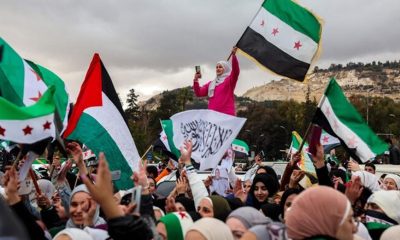
 International3 days ago
International3 days agoBashar Assad relatives arrested while trying to fly out of Lebanon
-
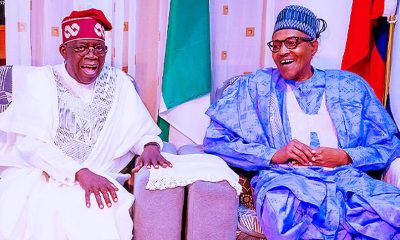
 Opinion3 days ago
Opinion3 days agoTinubu’s Buharization of NNPC By Farooq Kperogi
-

 Politics1 day ago
Politics1 day agoGbajabiamila speaks on his rumoured Lagos governorship ambition
-

 metro2 days ago
metro2 days agoWe’re not aware of VeryDarkMan’s missing N180m — Police
-

 metro1 day ago
metro1 day agoFarotimi to pursue disbarment over arrest, defamation allegations





